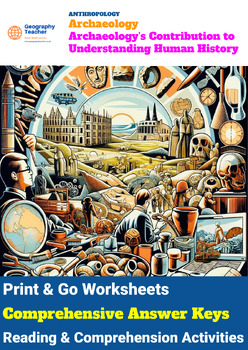Archaeology serves as a pivotal discipline within anthropology, facilitating a profound comprehension of human history through the excavation and analysis of material remains. It offers a lens through which we may examine the intricacies of past cultures, societies, and their evolution over time. This exploration is particularly enriched when approached from the perspective of cultural relativism, a concept that propounds the notion that a culture must be understood in its own context, without imposing external values or judgments.
The scope of archaeology encompasses a varied array of sites, artifacts, and ecofacts, each contributing uniquely to our understanding of human behavior and societal structures. Artifacts, human-made objects that have been used or altered, are often the primary focus. These may range from tools utilized for hunting or agricultural endeavors to pottery that signifies domestic or ceremonial practices. Ecofacts, such as seeds or animal bones, provide invaluable insights into subsistence patterns and environmental interactions.
One of the most compelling aspects of archaeology is its ability to challenge and redefine preconceptions about ancient civilizations. For instance, the discovery of advanced agricultural practices among early societies often contradicts the notion of primitive lifestyles. This disjunction between historical narratives and archaeological findings underscores the importance of viewing cultural practices through a relativistic lens. By acknowledging that diverse cultures may employ distinct methodologies to solve similar problems, archaeologists can paint a more nuanced portrait of human ingenuity and adaptability.
The process of excavation entails meticulous planning and methodical execution. It is not merely about unearthing treasures but rather entails a rigorous stratigraphic analysis to establish a chronological sequence of human activity. Each layer of soil may harbor remnants of different periods, and understanding these stratifications requires both scientific acumen and cultural sensitivity. For example, a site containing remnants of a long-abandoned settlement can reveal a continuum of human occupation, migration patterns, and shifts in socio-political dynamics.
Moreover, the application of various scientific techniques—such as radiocarbon dating, geochemical analysis, and remote sensing—has revolutionized the field of archaeology. These methodologies not only enhance the accuracy of dating artifacts but also enable archaeologists to discern patterns that may not be readily visible to the naked eye. A well-administered excavation is, therefore, a synergy between fieldwork and scientific inquiry, marrying the tangible past with contemporary analytical tools.
Cultural relativism plays a critical role in interpreting archaeological findings. The dismissal of ethnocentric biases allows for an appreciation of diverse cultural trajectories. This approach is particularly salient when addressing complex social structures and belief systems that may not conform to Western ideals. For instance, misinterpretations have historically arisen when viewing indigenous practices through a Eurocentric lens. An archaeological perspective informed by cultural relativism acknowledges the validity and significance of varied belief systems without imposing external moral judgments.
The analysis of material culture is the heart of archaeological investigation. By studying artifacts, researchers can infer not only technological advancements but also social organization, trade networks, and even spiritual beliefs of past civilizations. The exquisite craftsmanship observed in ancient pottery or metalwork often reflects an intricate understanding of materials and techniques that warrants appreciation and respect in its own right, rather than through a comparativist framework that privileges certain cultures over others.
Furthermore, the interplay between environment and human activity is a crucial area of study in archaeology. How did ancient societies adapt to their surroundings, and how did environmental changes spur innovation or decline? These questions underscore a dynamic relationship between humans and their environments, revealing that cultural practices are often responses to ecological challenges. This perspective fosters an understanding of sustainability and resilience that is increasingly relevant in contemporary discussions about climate change and environmental stewardship.
The narrative constructed through archaeology remains inherently incomplete, yet it serves to bridge the chasm between the past and present. Curating this historical narrative—whether through museums or academic publications—requires an acute awareness of ethical considerations. The preservation of cultural heritage is paramount, particularly in a global context where colonial histories have often led to the appropriation and commodification of cultural artifacts. The ethical responsibility of archaeologists extends beyond excavation; it encompasses advocacy for Indigenous rights and repatriation of artifacts to their countries of origin.
In observance of the enduring appeal of archaeology, one must consider the emotional and intellectual resonance it invokes. People are drawn to the tangible remnants of the past for both nostalgic and educational reasons. The allure of ancient ruins, the mystique surrounding lost civilizations, and the stories embedded within everyday objects evoke a fundamental curiosity about human origins and trajectories. This fascination emerges not solely from a desire to uncover historical facts, but from a profound yearning to understand the complexities of human existence across time and space.
In conclusion, archaeology, when viewed through the lens of cultural relativism, emerges as a robust scientific discipline that offers invaluable insights into the human condition. It invites an exploration of the diverse tapestries of cultural practices, emphasizing the importance of contextual understanding and ethical scholarly engagement. By fostering an appreciation for the multiplicity of human experiences, archaeology nurtures a greater awareness of our shared heritage and the intricate pathways that have led us to the present.
